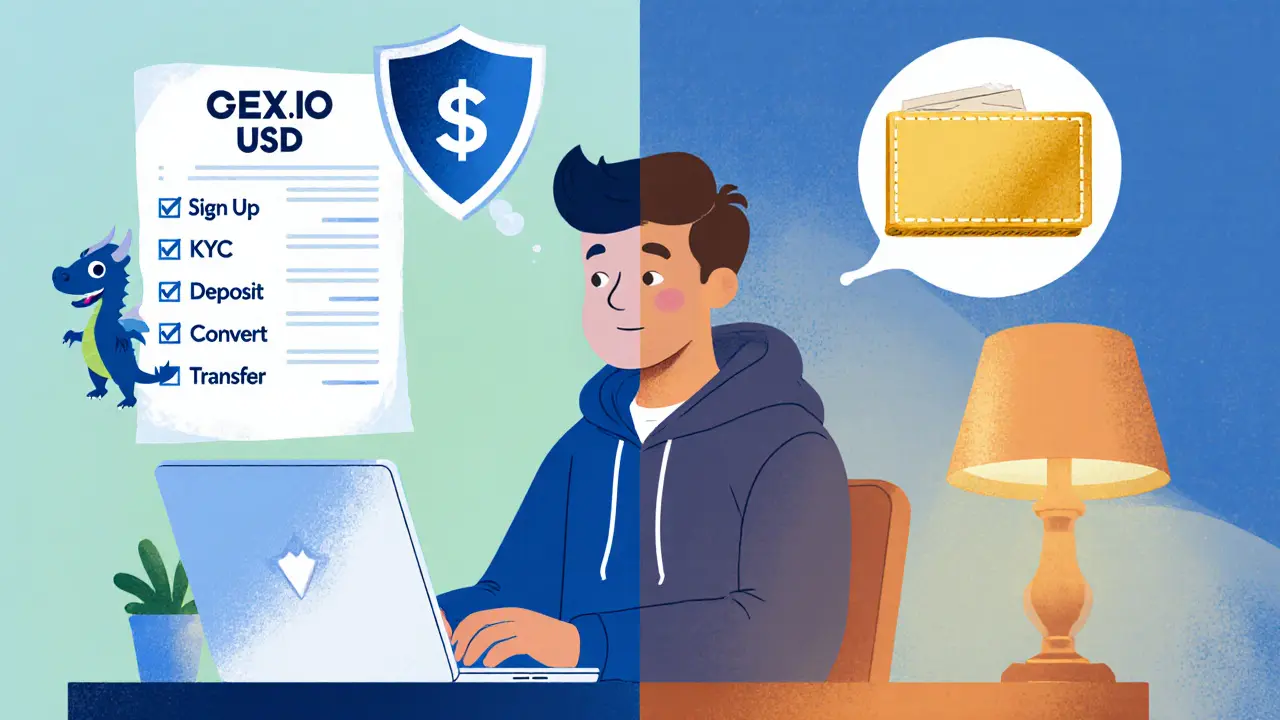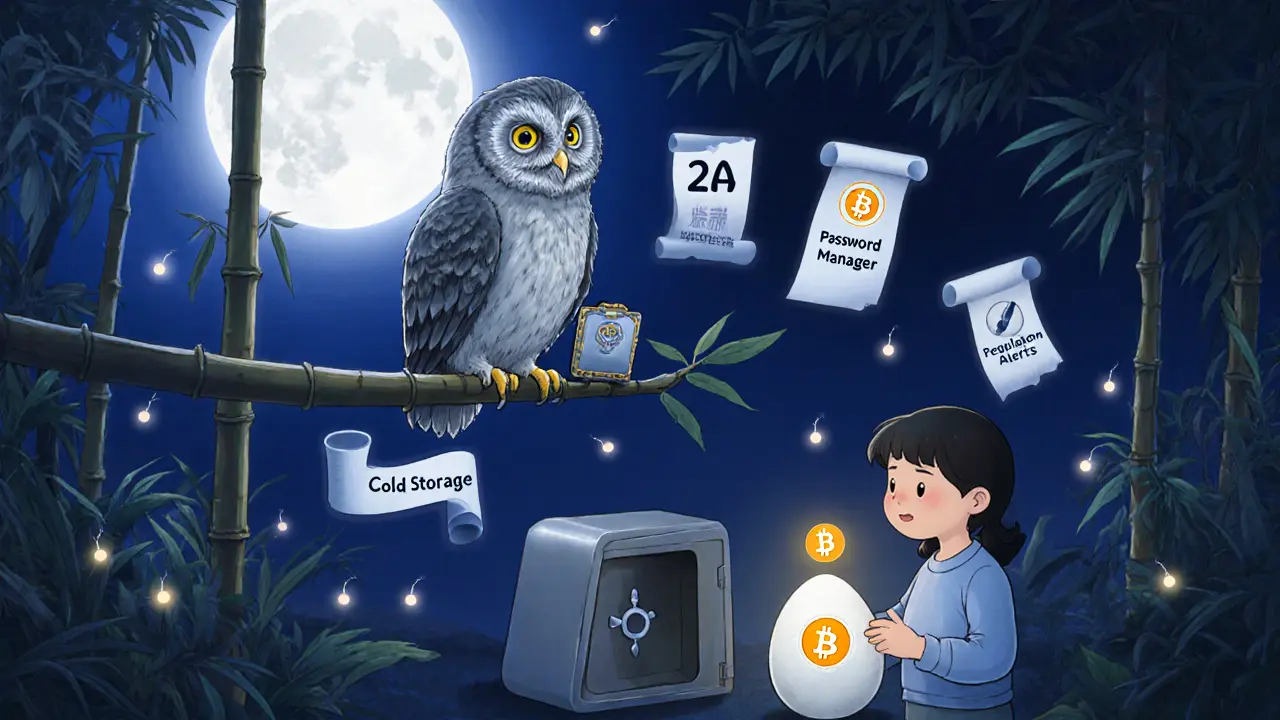Crypto Purchase Cost Calculator
Estimated Total Costs
Conversion Fee
Cost to convert CNY to supported fiat currency
0.5% - 2%
Exchange Fee
Trading fee on selected platform
0.01% - 0.5%+
Looking to buy crypto China but stuck on how to turn your yuan into digital coins? The market is still buzzing, but strict regulations make the path anything but straightforward. This guide walks you through every legal avenue, from international exchanges to peer‑to‑peer (P2P) platforms, and gives you the exact steps you need to start owning Bitcoin, USDT, or any other token today.
Regulatory landscape in 2025
Since the 2021 crackdown, Chinese authorities have banned domestic fiat‑to‑crypto on‑ramps. No bank or payment processor can legally facilitate a purchase of Bitcoin or any other digital asset with Chinese yuan (CNY). The rule still stands in 2025, meaning you cannot use a local exchange or a Chinese bank card to buy crypto directly.
That said, the government does not criminalize holding crypto. Chinese residents can still own and trade digital assets as long as the transaction happens outside the mainland’s financial system. The two practical routes are:
- International cryptocurrency exchanges that accept users from China.
- P2P marketplaces that match you with another person willing to trade fiat for crypto.
Both methods require extra caution - you’ll need a VPN or a “shadow” domain to reach the platforms, and you must stay on top of KYC (Know‑Your‑Customer) requirements that vary by service.
International exchanges that serve Chinese users
Among the dozens of global platforms, a handful stand out for reliability, fee transparency, and ease of use for Chinese residents.
CEX.IO is a UK‑based exchange that explicitly supports users in China. It offers a simple “Convert” tool that lets you turn USD, EUR, or GBP into Bitcoin, Ethereum, USDT, and more.
Binance remains the world’s biggest exchange, providing a 0.1% taker/maker fee, support for over 400 crypto pairs, and a P2P hub that accepts a variety of payment methods.
MEXC shines with ultra‑low fees (0.01% taker, 0% maker) and a P2P “Quick Buy” feature that works with bank cards, even though it does not always enforce KYC for small trades.
Kraken offers a solid reputation for security, a 0.4% taker fee, and a straightforward fiat‑deposit workflow for users who can wire money overseas.
Swissquote is highlighted by BrokerChooser as the best crypto broker for Chinese investors, though its fees are higher than most pure‑exchange platforms.
Step‑by‑step: Buying crypto on CEX.IO
- Visit the CEX.IO website (you may need a VPN) and click “SignUp”.
- Complete the registration form with a valid email and strong password.
- Navigate to the verification page. Upload a government‑issued ID, a selfie, and proof of address. The KYC check usually finishes within 24hours.
- Once verified, go to “Deposit”. Choose USD, EUR, or GBP as your fiat currency - CEX.IO does not accept CNY directly, so you’ll need an offshore bank account or a payment service that can convert yuan to one of these currencies.
- Select a payment method (bank transfer, credit/debit card, or Apple/Google Pay). Follow the on‑screen instructions to move funds into your CEX.IO wallet.
- When the deposit is confirmed, open the “Wallet” tab and click the “Convert” button next to your fiat balance.
- Pick the cryptocurrency you want (e.g., Bitcoin), enter the amount you wish to spend, and hit “Convert”. The trade executes instantly at the current market rate.
- Transfer the newly acquired crypto to a personal wallet (hardware or software) for extra security. Remember: keeping large balances on an exchange is risky.
All of these steps can be performed from CEX.IO’s mobile app on iOS or Android, which mirrors the web workflow.
Platform comparison for Chinese users
| Platform | Supported Fiat (via offshore) | Taker/Maker Fees | Crypto Count | KYC Requirement | Notable P2P Option |
|---|---|---|---|---|---|
| CEX.IO | USD, EUR, GBP | 0.10% / 0.10% | 200+ | Yes (within 24h) | Convert service |
| Binance | USD, EUR, CNY (P2P only) | 0.10% / 0.10% | 426 | Yes (varies by region) | BinanceP2P |
| MEXC | USD, EUR, CNY (QuickBuy) | 0.01% / 0% | 1,767 | Optional for small trades | MEXCP2P |
| Kraken | USD, EUR, GBP | 0.40% / 0.25% | 472 | Yes | None (exchange only) |
| Swissquote | CHF, EUR, USD | High (≈0.5%+) | 100+ | Yes (strict) | Broker service |

Peer‑to‑peer (P2P) trading in China
When you can’t or don’t want to use an international exchange, P2P platforms let you trade directly with another person. The two biggest names are:
LocalBitcoins offers an escrow system that holds the crypto until the seller confirms receipt of fiat via Alipay, WeChat Pay, or bank transfer.
Paxful supports over 300 payment methods, including popular Chinese wallets, and also provides escrow protection.
Here’s a quick workflow for a safe P2P trade:
- Create an account on the P2P platform and enable two‑factor authentication (2FA).
- Verify your identity - most platforms require a photo ID for escrow activation.
- Search for offers that accept CNY and the payment method you prefer (e.g., Alipay).
- Check the seller’s reputation score, number of completed trades, and any user reviews.
- Initiate the trade, deposit the agreed amount of yuan into the seller’s bank account, and mark the payment as “sent”.
- The platform’s escrow holds the crypto. Once the seller confirms receipt, the crypto is released to your wallet.
- Immediately move the received coins to a personal, preferably hardware, wallet.
Always start with small amounts to test the counterparties. Fraud is rare on reputable platforms, but the risk is higher than on regulated exchanges.
Security best practices
Whether you choose an exchange or a P2P marketplace, follow these rules:
- Enable two‑factor authentication (2FA) - preferably using an authenticator app, not SMS.
- Keep the bulk of your holdings in a cold‑storage wallet. Use a hardware device like Ledger or Trezor.
- Never share your private keys or seed phrase.
- Use a unique, strong password for each platform and store it in a password manager.
- Regularly review withdrawal limits and enable withdrawal whitelist IPs if the exchange supports it.
Understanding fees
Fees can bite into your profits, especially when you have to convert CNY to USD/EUR first. Typical cost breakdowns:
- Conversion fee: Offshore banks or payment services charge 0.5%-2% to turn yuan into a supported fiat.
- Exchange trading fee: Ranges from 0.01% (MEXC taker) to 0.5%+ (Swissquote).
- Withdrawal fee: Most exchanges charge a flat network fee for moving Bitcoin or USDT off‑platform.
- P2P escrow fee: Usually 0.5%-1% on the crypto side, payable by the buyer.
Calculate the total cost before committing a large amount. A quick spreadsheet can help you compare: (CNY → USD conversion) + (exchange fee) + (withdrawal fee).
Troubleshooting common issues
Deposit stuck or missing? Verify the IBAN or SWIFT code you used matches the exchange’s account details. Some banks block transfers to foreign entities flagged as “crypto”. Contact your bank’s compliance department for clarification.
Verification rejected? Double‑check that your ID photo is clear, the document isn’t expired, and the selfie matches the ID. Some platforms also require a utility bill showing the same address as your ID.
Trade not executed? Market volatility can cause price slippage. Use “limit orders” on exchanges like Binance or Kraken to lock in your desired price.
Escrow release problem on P2P? If the seller claims payment but you haven’t sent it, open a dispute immediately. Provide screenshots of your bank transfer receipt; the platform will mediate.
Staying up‑to‑date
China’s regulatory posture may shift, and exchange policies can change overnight. Set up Google Alerts for keywords like “China crypto regulation” and follow official blogs of the platforms you use. Joining Chinese crypto telegram or WeChat groups (with verified admins) can also give you early warnings about service disruptions.

Frequently Asked Questions
Can I use Chinese yuan (CNY) directly on international exchanges?
Most exchanges do not accept CNY deposits because mainland banks are barred from processing crypto‑related transfers. You’ll need to convert yuan to USD, EUR, or GBP through an offshore bank or a payment service that supports those currencies.
Is P2P trading legal in China?
P2P transactions are not expressly illegal, but they exist in a gray area. Using reputable platforms with escrow protection reduces legal exposure, but you should still stay aware of any new government directives.
What’s the safest way to store my crypto after purchase?
Transfer the coins to a hardware wallet you control. Cold storage devices keep the private keys offline, making them immune to exchange hacks.
Do I need to pay taxes on crypto gains in China?
China treats crypto gains as taxable income under capital‑gain rules. Report any profit on your individual income tax return and keep transaction records for verification.
Which platform has the lowest overall cost for buying Bitcoin?
MEXC often offers the lowest combined fee (0.01% taker + cheap fiat conversion). However, you must factor in the cost of converting CNY to a supported currency, which can offset the trading fee advantage.


Comments
Bobby Ferew
The fee stack can melt your profit faster than a summer heatwave.
November 4, 2024 AT 07:06
celester Johnson
When you convert yuan to offshore fiat, you’re essentially walking a tightrope of exchange rates and hidden spreads. The macro‑level arbitrage opportunities disappear as soon as the bank applies its own markup. Meanwhile, KYC checks add a bureaucratic latency that feels almost philosophical – you’re forced to confront the identity of your own money. In the end, the process teaches you more about institutional friction than about crypto itself.
November 9, 2024 AT 18:01
Prince Chaudhary
Even if the regulatory climate feels opaque, the steps outlined are still actionable. Stick to the checklist and you’ll avoid the most common pitfalls.
November 15, 2024 AT 04:55
John Kinh
Sure, but who really needs another guide about buying crypto from China? 🙄
November 20, 2024 AT 15:50
Mark Camden
It is incumbent upon every participant to recognize that circumventing domestic fiat‑to‑crypto bans flirts with legal gray zones. While the guide offers practical routes, the moral responsibility to comply with national legislation remains paramount. Moreover, promoting offshore conversions may inadvertently encourage capital flight, a concern for societal cohesion. Readers should therefore weigh personal benefit against broader fiscal stewardship.
November 26, 2024 AT 02:44
Evie View
Let’s dissect the transaction pipeline: you start with a CNY deposit, then hit a conversion gateway riddled with AML‑driven throttling, followed by a taker fee that subtly erodes your base cost. The latency introduced by KYC verification can be a game‑changer, especially when market volatility spikes. Add to that the escrow fee on P2P platforms, which operates as a de‑facto tax on every micro‑trade. If you’re not monitoring the fee stack in real‑time, you’ll watch your intended purchase shrink before your eyes. Bottom line: factor every micro‑percentage, or you’ll end up paying for the service you thought you were avoiding.
December 1, 2024 AT 13:39
Kate Roberge
Honestly, the “best overall cost” claim feels like marketing fluff; most platforms hide fees in the conversion step. Binance’s P2P might look cheap, but you still pay a hidden spread when you cash out. If you’re hunting for true low‑cost entry, MEXC’s QuickBuy is the only one that actually lives up to the hype.
December 7, 2024 AT 00:33
Oreoluwa Towoju
Start small, test the escrow, then scale up once trust is established. This mitigates risk while you get a feel for the process.
December 12, 2024 AT 11:28
Jason Brittin
Yo, the guide is solid but remember: VPNs can lag, and you might get disconnected right before a confirmation. 🤷♂️ Keep an eye on the time stamps, because the exchange rate can flip while you’re stuck in a tunnel. Also, double‑check that the payment method you choose isn’t flagged by your bank as “high‑risk”. Otherwise you’ll end up fighting customer support for hours.
December 17, 2024 AT 22:22
Amie Wilensky
Well, you’ve got the steps laid out, but let’s be real, the devil is in the details, the fine print, the hidden costs, the regulatory haziness, the ever‑changing KYC requirements, the exchange rate spreads, the network congestion, the withdrawal fees, and, of course, the occasional scam that slips by even the most vigilant user. Each of those factors can turn a seemingly cheap transaction into a pricey ordeal. So, while the guide offers a roadmap, you still need a compass. And that compass? It’s called “due diligence”.
December 23, 2024 AT 09:17
MD Razu
The journey from CNY to crypto is more than a mechanical conversion; it’s a microcosm of the broader struggle between sovereign monetary control and decentralized finance. When you first consider converting yuan, you’re forced to confront the reality that the People’s Bank of China does not recognize crypto as a legitimate asset class. This institutional repudiation creates an artificial scarcity of on‑ramps, which in turn inflates the price you ultimately pay. By routing your funds through offshore banks, you introduce an additional layer of counterparty risk that most newcomers overlook. The offshore conversion fee, typically ranging from half a percent to two percent, is just the tip of the iceberg. Once the fiat lands on an exchange, the taker fee-whether 0.01% on MEXC or 0.40% on Kraken-eats into your capital in proportion to market liquidity. Moreover, network congestion can spike withdrawal fees at inopportune moments, turning a modest purchase into an unexpectedly expensive one. The P2P route sidesteps some of these fees but replaces them with escrow costs and the ever‑present danger of a counterpart refusing to release funds. Trust scores, while useful, are not infallible, and a single bad trade can erode confidence in the entire ecosystem. The regulatory backdrop adds a psychological cost: the fear of being flagged by authorities can lead to hasty decisions and suboptimal trade execution. Even the choice of hardware wallet matters, as a poorly secured device can nullify any savings amassed through fee arbitration. In essence, each decision point-conversion, exchange, withdrawal, storage-introduces a multiplicative risk factor that compounds the overall expense. Therefore, a holistic approach that maps out each cost node before committing capital is indispensable. Finally, staying informed about policy shifts is crucial; a new regulation can render an entire platform unusable overnight, wiping out both time and money.
December 28, 2024 AT 20:11
Charles Banks Jr.
Nice breakdown, but no one reads that many sentences before they’re scrolling past.
January 3, 2025 AT 07:06
Ben Dwyer
Set up 2FA on every platform you use, and keep a written note of your withdrawal whitelist IPs. This simple habit can stop a lot of unwanted sleepless nights.
January 8, 2025 AT 18:00
Lindsay Miller
I get how overwhelming the fee tables look, but taking it step by step really helps. Just focus on one platform at a time.
January 14, 2025 AT 04:55
Katrinka Scribner
Wow, that was a lot of info, thanks for the deep dive! 😃👍
January 19, 2025 AT 15:49
VICKIE MALBRUE
Every hurdle is just a stepping stone to financial freedom.
January 25, 2025 AT 02:44
Waynne Kilian
Understanding the landscape is the first move toward smart investing. By sharing resources, we all grow stronger as a community. Keep the dialogue open and inclusive.
January 30, 2025 AT 13:39
Naomi Snelling
They don’t want you to know about offshore banks because it threatens the status quo. Stay vigilant.
February 5, 2025 AT 00:33
Michael Wilkinson
Even if you’re aggressive about securing your assets, remember that reckless shortcuts can land you in legal trouble. The balance between security and compliance is delicate. Take the time to verify every step.
February 10, 2025 AT 11:28
Billy Krzemien
Exactly, a measured approach saves headaches later.
February 15, 2025 AT 22:22
april harper
The paradox of seeking freedom through crypto while navigating state‑imposed barriers feels almost existential. One could argue that the act of conversion is a silent protest against fiat dominance. Yet, the very tools we use-bank accounts, VPNs-are still shackles of the old order. So the journey is both rebellion and reliance simultaneously. In the end, we’re left questioning what true autonomy really means.
February 21, 2025 AT 09:17
Clint Barnett
When you’re starting out, think of the process like a puzzle: each piece-VPN, KYC, exchange, wallet-must fit perfectly. Use a reputable VPN provider to avoid connection drops mid‑transaction. Choose an exchange with a transparent fee schedule, like MEXC, to keep costs low. After purchase, move the crypto to a hardware wallet you control. And finally, document every step; a written trail helps if any dispute arises.
February 26, 2025 AT 20:11
Jacob Anderson
Great advice, but remember that “reputable” is a moving target in this space.
March 4, 2025 AT 07:06